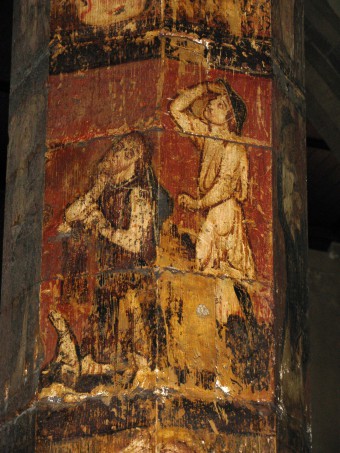Last night I joined more than a hundred other people who had come out to hear Professor Richard Gameson give a lecture at the Canterbury Cathedral Archives for the local branch of the Historical Association. Professor Gameson drew such a large audience because he is well known as an expert on Anglo-Saxon manuscripts and book culture, and although now based in Durham at the university there, for over a decade he was an important member of the History staff at the University of Kent. While at Kent he worked on the pre-Conquest manuscripts associated with the city’s ancient, great Benedictine houses, especially those linked to the monastic library at Canterbury Cathedral. As he discovered this involved tracking down as far as possible the movement over time of various books and fragments of manuscripts that helped him to construct a picture of relationships among monasteries and important individual churchmen.
One of my favourite scenes from the painted pillar in Faversham parish church – the Annunciation to the Shepherds
Photograph: by Imogen Corrigan
His work at Durham has extended this analysis through his detailed exploration of scribal and book culture of Northumbria, including identifying the survival of eighty manuscripts, albeit some only survive as fragments – part of a single page. This is a fantastic feat of scholarship and means that he is able to discuss such issues as scribal production and the likely locations of ecclesiastical scriptoria, the networks whereby books travelled across western Christendom, and matters of influence be they the papacy in Rome, the Irish monastic tradition or more localised ideas. By so doing he was able to treat his audience last night to a breath-taking tour around the Northumbrian centres of Anglo-Saxon manuscript production, the place of Bede as a prodigious author and commentator, and, finally, to provide a context for the Lindisfarne Gospels – that iconic reminder of the richness of our Anglo-Saxon heritage, but a book that contemporaries knew had been ‘bettered’ in terms of its form and decoration.
As you might expect after such a tour de force, his audience left delighted to have been present on such an occasion. Consequently it is worth reminding readers of this blog that Richard Gameson will be back lecturing in Canterbury in 2016 at this Centre and Canterbury Cathedral Library’s joint Medieval History Weekend: Exploring the Middle Ages. Professor Gameson will be speaking on Friday evening on 1 April 2016 as the opening event, so please do make a note of this and also that there will be plenty of other fascinating lectures over the following two days, that is all day Saturday and most of Sunday (details hopefully will be available next month).
In addition to showing just how important the pains-taking work of such scholars has to be to shed light on our ancient past, Professor Gameson’s research highlights just how vital it is to preserve as much as possible, whether it be beautifully decorated great books or tiny fragments of parchment. Furthermore, these artefacts need to be available to scholars, especially now that we have far more advanced technological tools to explore, for example, the composition of various pigments with the potential to affirm or disprove previously held theories. Although some of these manuscripts are in private hands, county and other public archives remain exceedingly important repositories of a vast array of materials of use to academics and many other researchers. I appreciate that I have mentioned this before but the threat to these resources is especially pertinent at a time when the squeeze on public finances seems unrelenting, as seen amongst other places in Kent. It is a truism that you don’t realise what you have until you lose it and this may be particularly the case with respect to the means of bringing the past alive for people today and for future generations.
 Centre for Kent History and Heritage
Centre for Kent History and Heritage Sheila Sweetinburgh
Sheila Sweetinburgh 565
565


